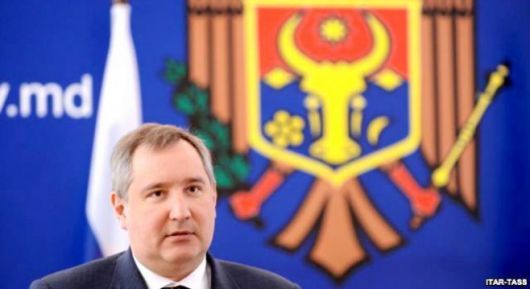
Rogozin Threatens Moldova with Sanctions over Association Agreement with the European Union
Publication: Eurasia Daily Monitor Volume: 10 Issue: 155
By:

Russia’s Deputy Prime Minister Dmitry Rogozin visited Moldova on September 2–3, in his parallel capacities as President Vladimir Putin’s special envoy “on Transnistria” (“po Pridnestroviyu”) and as Russian co-chairman of the Russia-Moldova Inter-Governmental Economic Cooperation Commission.
This visit had no other purpose than to threaten Moldova with economic sanctions and the definitive loss of Transnistria, in the event that Moldova concludes the association and free trade agreements with the European Union at the Vilnius summit in November. On the morrow of Rogozin’s visit, Russia’s chief sanitary inspector Gennady Onishchenko threatened to re-impose restrictions on the import of Moldovan wines, fruit and vegetables to Russia.
Rogozin held talks with Moldova’s Prime Minister Iurie Leanca and Deputy Prime Minister Valeriu Lazar (Moldovan co-chair of the inter-governmental commission). Rogozin also issued those warnings in three statements with overlapping content for the media in Moscow, Chisinau, and Tiraspol, respectively. He enumerated Russia’s possible responses to the Moldova-EU agreements (Interfax, September 1, 2; Rossiya-24 TV, Itar-Tass, Novyi Region [Tiraspol], September 2; Jurnal de Chisinau, September 2):
Russia would “inevitably revise its existing trade agreements with Moldova,” implying possible restrictions on the access of Moldovan agricultural products to the Russian market (Russia’s ambassador in Chisinau, Farit Mukhametshin, had recently aired this warning explicitly [Infotag, August 30]).
Chisinau “would make a serious mistake” by concluding the agreements with the EU even as “hundreds of thousands of Moldovans work in Russia,” implying possible restrictions on Moldovan migrant labor in Russia;
“Energy is important, the cold season is near, winter on its way. We hope that you will not freeze this winter” (parting shot at his press briefing in Chisinau), alluding to the unsettled situation with the Gazprom-Moldovagaz supply contract;
Moldova “would lose Transnistria, if Moldova continues moving toward the European Union;” and metaphorically, “Moldova’s train en route to Europe would lose its wagons in Transnistria.”
Rogozin attacked Moldova’s “so-called pro-European government” for “disregarding its own people, and all the more [disregarding] Transnistria,” in the process of negotiating the Moldova-EU agreements. The first part of this statement alludes to the erosion of the EU’s popularity in Moldova and the rise of Russia’s popularity there, emboldening local pro-Russian parties to demand pre-term elections or a referendum on Moldova’s external orientation. The second part of that statement seems to reflect Russia’s position that its Tiraspol protégés should play a role in Chisinau’s foreign policy decisions—a key tenet of Russian proposals to “federalize” Moldova. Reflecting that same view, Rogozin reproached Chisinau for having signed a military cooperation agreement with Romania, “a NATO country, without consulting Tiraspol” (Infotag, September 2).
Chisinau has actually invited Tiraspol to sit in the economic negotiations with the EU as part of Moldova’s delegation, but Tiraspol has seldom taken up these invitations. Chisinau has also held many information sessions for Transnistria business circles to take advantage of the impending Moldova-EU agreements. Moldova is keen in its own interest to have Transnistria and its population included in Moldova-EU agreements and projects. Tiraspol authorities have not responded thus far. Instead, they emphasize their own orientation toward Russia and its Eurasian groupings.
On September 3, Russia’s consumer goods and sanitary inspectorate (Rospotrebnadzor) chief, Gennady Onishchenko, announced that his authority has rejected a consignment of 28,000 liters of Moldovan wine, purportedly for falling short of Russian sanitary criteria. Onishchenko had issued two warnings to that effect during August. His September 3 announcement, however, added a threat of embargoing Moldovan wines, “reverting to the 2006 situation,” when Russia imposed a politically motivated full ban on Moldovan and Georgian wines and agricultural products. Moscow relented little by little during the ensuing years on Moldovan wines, and only in 2013 on a trickle of Georgian wine.
Moldova has been heavily hit, wines being its number one export article by far, and Russia its largest market by far. Moldovan wine exports to Russia declined in value from $235 million in 2005 (the last pre-sanctions year) down to $61 million in 2012; and from a Russian market share of nearly 50 percent reported in 2005, down to 10 to 12 percent market share annually in recent years in Russia (Interfax, Moldpres, September 3).
Rogozin, basically, nodded when Moldovan officials tried to pin him down on recognizing Moldova’s territorial integrity and borders. Russia’s recognition is on paper only, and sometimes not even on paper. Rogozin’s parallel appointments, as Russian presidential envoy “on Transnistria” and Russian head of the Russia-Moldova inter-governmental commission, exemplify this deliberate ambiguity. The Russian government deals with Chisinau and with Tiraspol in separate channels. Moscow handles its relations with two parts of Moldova’s territory on two different tracks, both of them under Rogozin’s supervision, but operating separately from each other. The Russian government routinely deals with Tiraspol directly, bypassing Chisinau. The unlawful presence of Russian troops also negates Moldova’s sovereignty and territorial integrity in practice, despite its recognition on paper.
Putin’s envoy failed to impress the Moldovan government into concessions. He did not obtain Chisinau’s consent for the opening of a Russian consulate in Tiraspol, or re-equipping Russia troops there, or re-opening Tiraspol’s military airport. The Moldovan government and the EU are irreversibly on course toward concluding association, trade, and visa liberalization agreements. However, Russian economic sanctions, if imposed, could destabilize Moldova politically, and play into the hands of the Communist and Russophile opposition.




